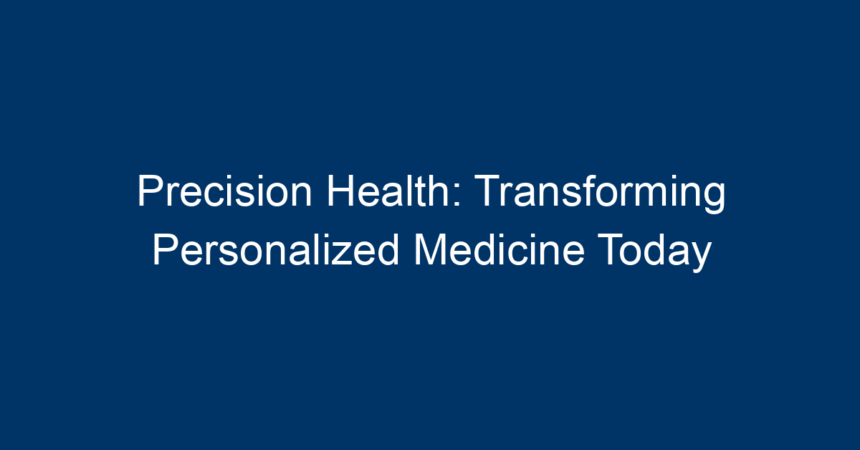Introduction
In a world where health challenges are increasingly complex, the need for tailored medical interventions has never been more pronounced. Enter precision health — a groundbreaking approach that transcends traditional medicine by focusing on individual variability in genes, environment, and lifestyle. This innovative model is reshaping how healthcare providers diagnose and treat diseases, ultimately leading to more effective and personalized care. In this article, we will explore the core concepts of precision health, its evolution, and its practical implications for personalized medicine today.
Understanding Precision Health
What is Precision Health?
Precision health is a holistic approach that integrates the fields of genomics, data science, and behavioral health to develop customized treatments for patients. Unlike the one-size-fits-all model of traditional medicine, precision health recognizes that each individual is unique and requires different strategies for optimal well-being.
Key aspects of precision health include:
- Genomic Profiling: Assessing a person’s genetic makeup to identify vulnerabilities to certain diseases.
- Lifestyle Assessment: Evaluating personal habits like diet, exercise, and smoking to tailor preventative measures.
- Environmental Factors: Considering external influences such as pollution, socioeconomic status, and living conditions in treatment plans.
The Evolution of Personalized Medicine
The roots of precision health can be traced back to the Human Genome Project, which successfully mapped all the genes in the human DNA. This monumental achievement paved the way for advancements in genomics and molecular biology, setting the stage for personalized medicine. Over the years, significant breakthroughs like CRISPR gene editing and advancements in big data analytics have further propelled the development of precision health.
The Role of Technology in Precision Health
Data-Driven Insights
Technology is at the forefront of potential advancements in precision health. With vast amounts of health data available, data analytics plays a crucial role in discerning patterns and making informed decisions. Machine learning algorithms can sift through genomic data to identify mutations associated with various diseases, enabling healthcare providers to tailor treatment plans that are uniquely suited to individual patients.
Wearable Technology and Mobile Health Apps
Wearable devices and health apps provide real-time data that can inform medical decisions.
Benefits of Wearables
- Continuous Monitoring: Devices track vital signs to help manage chronic conditions, such as diabetes or heart disease.
- Behavioral Insights: Fitness trackers encourage healthier lifestyle choices by monitoring physical activity and sleep patterns.
These tools empower individuals to take control of their health, effectively turning them into active participants in their own care.
Key Applications of Precision Health
Oncology
In the realm of oncology, precision health is revolutionizing treatment options. By analyzing the genetic makeup of tumors, oncologists can identify specific mutations and select therapies that target those abnormalities. This not only improves survival rates but also minimizes the side effects associated with traditional treatments.
Cardiovascular Health
Precision health is making waves in cardiovascular medicine as well. Genetic tests can predict a person’s risk for heart disease and stroke. Armed with this information, healthcare providers can recommend personalized prevention strategies, from lifestyle modifications to tailored medications.
Pharmacogenomics
Pharmacogenomics, or the study of how genes affect an individual’s response to drugs, lies at the heart of precision medicine. By understanding a patient’s genetic profile, doctors can prescribe medications that are more effective and have fewer adverse effects, leading to better therapeutic outcomes.
Challenges Facing Precision Health
Despite its promising advantages, the adoption of precision health is not without challenges.
Data Privacy Concerns
As health data collection grows, so do concerns related to privacy. Striking a balance between the benefits of data availability and the need for patient confidentiality is crucial. Regulatory frameworks like HIPAA in the U.S. aim to protect patient information, but ongoing vigilance is necessary.
Cost and Accessibility
Currently, many precision health technologies are expensive and not widely available. This raises questions about equity in healthcare. To truly realize the potential of precision health, efforts must be made to ensure that these advancements are accessible to diverse populations, regardless of their socioeconomic status.
Future of Precision Health
Integrating Machine Learning and AI
The future of precision health lies in the integration of machine learning and AI in healthcare delivery. As these technologies evolve, they will provide deeper insights into patient data and drive more accurate predictions regarding health outcomes.
Global Collaborations
International collaborations are essential for advancing research in precision health. By pooling resources and knowledge, countries can work together to tackle global health disparities and ensure that the benefits of precision medicine are realized worldwide.
Actionable Insights for Individuals and Healthcare Providers
- Stay Informed: Individuals should educate themselves about precision health and how it may impact their healthcare decisions.
- Discuss Genetic Testing with Healthcare Providers: Open a dialogue with your healthcare provider about the appropriateness of genetic testing for your personal and family medical history.
- Leverage Technology: Utilize wearable technologies and health apps to monitor your health metrics actively.
- Advocate for Accessibility: Support policies that promote the availability of precision health technologies to all communities, ensuring equitable access to personalized medical care.
Conclusion
As we stand on the cusp of a healthcare revolution fueled by precision health, the potential to transform personalized medicine is immense. By leveraging technology, embracing individualized treatments, and addressing the challenges ahead, we can move towards a future where healthcare is tailored uniquely to each individual.
The time to act is now. Whether you are a patient, a healthcare provider, or a policymaker, embracing the principles of precision health can lead to improved health outcomes and a healthier society. Let’s champion the cause of precision health today for a better tomorrow.




